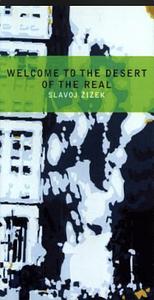Take a photo of a barcode or cover
18 reviews for:
Welcome to the Desert of the Real: Five Essays on September 11 and Related Dates
Slavoj Žižek
18 reviews for:
Welcome to the Desert of the Real: Five Essays on September 11 and Related Dates
Slavoj Žižek
In short, is it not that today, in our resigned postideological era which admits no positive Absolutes, the only legitimate candidate for the Absolute are radically evil acts?
This is a book about dreams. The philosopher notes early that in developing nations people dream about making it to the West, while First Worlders dream about the end of the world. Slavoj Žižek is coy like that. Throughout Welcome To The Desert of the Real he displays his range without much rigor. It doesn't read as caprice, it functions as serial questions, those that make us readers uncomfortable. The Western Malaise is one of excess. Lacan offered diagnosis some time back. we now need to cut ourselves, distract our neuroses in reality programming. We to be displaced by the Spectacle. Our choices leave us docile. We stared at the remains of the World Trade Center and asked how could this happen here? The author poses that we should've reacted that this shouldn't happen again anywhere.
This is a riveting work. Many are critical of Žižek's recourse to popular cultural. I am not. While being unaware of the title being a line from The Matrix, I find the analogy comfortably disturbing.
This is a book about dreams. The philosopher notes early that in developing nations people dream about making it to the West, while First Worlders dream about the end of the world. Slavoj Žižek is coy like that. Throughout Welcome To The Desert of the Real he displays his range without much rigor. It doesn't read as caprice, it functions as serial questions, those that make us readers uncomfortable. The Western Malaise is one of excess. Lacan offered diagnosis some time back. we now need to cut ourselves, distract our neuroses in reality programming. We to be displaced by the Spectacle. Our choices leave us docile. We stared at the remains of the World Trade Center and asked how could this happen here? The author poses that we should've reacted that this shouldn't happen again anywhere.
This is a riveting work. Many are critical of Žižek's recourse to popular cultural. I am not. While being unaware of the title being a line from The Matrix, I find the analogy comfortably disturbing.
challenging
informative
reflective
slow-paced
Dancing around the events of 9/11, Slavoj Zizek holds little back in discussing the current global condition. While refusing to take sides, Zizek criticizes the West, as well as the East, democracy and fundamentalism but also demonstrating the flawed reliance on such dichotomies of choice. According to Zizek, the 'war on terrorism' has been presented in the West as a "forced choice: you're free to decide, on condition that you make the right choice. [...:] as if the only alternative to 'fundamentalism' is the political system of liberal parliamentary democracy" (3). Zizek explains that pre-9/11, terrorism was more commonly a piece of distant news or entertainment (i.e. Hollywood disaster movies); "it was before the WTC collapse that we lived in our reality, perceiving Third World horrors as something which was not actually part of our social reality, as something which existed (for us) as a spectral apparition on the (TV) screen - and what happened on September 11 was that this fantasmatic screen apparition entered our reality" (16).
Zizek's subject matter varies (9/11, the Holocaust, the Israeli-Palestinian struggle, Shakespeare, film criticism, etc), and his style is often all over the place, leaving the reader with a maze to navigate; however, while these thoughts can be fragmented and contradictory, Zizek still manages a little book packed with big ideas. These essays, if anything, demand attention, forcing the reader to stop and think.
Zizek's subject matter varies (9/11, the Holocaust, the Israeli-Palestinian struggle, Shakespeare, film criticism, etc), and his style is often all over the place, leaving the reader with a maze to navigate; however, while these thoughts can be fragmented and contradictory, Zizek still manages a little book packed with big ideas. These essays, if anything, demand attention, forcing the reader to stop and think.
tense
One is tempted to resuscitate here the old Marxist 'humanist' opposition of 'relations between things' and 'relations between persons': in the much celebrated free circulation opened up by global capitalism, it is 'things' (commodities) which freely circulate, while the circulation of 'persons' is more and more controlled. This new racism of the developed world is in a way much more brutal than the previous ones: its implicit legitimization is neither naturalist (the 'natural' superiority of the developed West) nor any longer culturalist (we in the West also want to preserve our cultural identity), but unabashed economic egotism...
Moderate: Genocide
challenging
informative
reflective
fast-paced
challenging
dark
funny
informative
reflective
slow-paced
challenging
dark
informative
reflective
medium-paced
This is the dude from "A Pervert's Guide to Ideology"
I became familiar with Žižek as a graduate student (pause, dear reader, to mumble as many grad student cliches as you like...I'll wait). That was several years ago, but I compulsively return to Žižek once or twice a year, because--despite his idiosyncratic, meandering argumentative style--he is more often than not genuinely insightful. Welcome to the Desert of the Real is no exception. In this short, five-essay book, Žižek unpacks the symbolic and ideological significance of the United States' response to 9/11 while also suggesting that this misguided response was the predictably excessive consequence of capitalism itself. Pivoting from an analysis of Francis Ford Coppola's Apocalypse Now, Žižek writes, "Power generates its own excess, which it has to annihilate in an operation that has to imitate what it fights...Is this not the truth behind the fact that Bin Laden and the Taliban emerged as part of the CIA-supported anti-Soviet guerrilla movement in Afghanistan, and behind the fact that Noriega in Panama was an ex-CIA agent? Is not the USA fighting its own excess in all these cases?" (27). Observations of this sort speak to Žižek's rhetorical power. Could we not make a similar observation now, in 2016, about the Republican party and its feverish altercation with Donald Trump and his constituency? Are they not simply fighting to eradicate their political and ideological excess?
Chapter 4 "From Homo sucker to Homo sacer" is certainly the one essay from this collection I encourage a hesitant reader to read. In this essay, Žižek plays with Agamben's notion Homo sacer, a human being (in theory) who does not exist or have a place in the political community. Pivoting from Agamben, Žižek emphasizes the ways in which discourse, specifically post-9/11 discourse, surrounding democracy, torture, freedom, and righteous revenge creates a blurred political space where "a state of peace itself can at the same time be a state of emergency" (107). Yet even as I write this, I do so with trepidation and that's part of the problem I often have with Žižek. As a reader, I feel like I'm sifting for a throughline when one probably doesn't exist. Therefore, read Žižek carefully, and don't hesitate to put him down if he is not for you.
Chapter 4 "From Homo sucker to Homo sacer" is certainly the one essay from this collection I encourage a hesitant reader to read. In this essay, Žižek plays with Agamben's notion Homo sacer, a human being (in theory) who does not exist or have a place in the political community. Pivoting from Agamben, Žižek emphasizes the ways in which discourse, specifically post-9/11 discourse, surrounding democracy, torture, freedom, and righteous revenge creates a blurred political space where "a state of peace itself can at the same time be a state of emergency" (107). Yet even as I write this, I do so with trepidation and that's part of the problem I often have with Žižek. As a reader, I feel like I'm sifting for a throughline when one probably doesn't exist. Therefore, read Žižek carefully, and don't hesitate to put him down if he is not for you.
adventurous
challenging
funny
medium-paced



